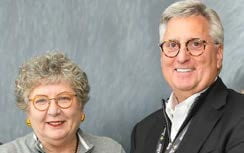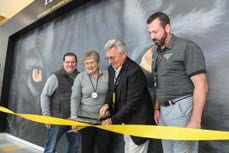 When COVID-19 forced Towson University to turn to remote teaching, Mariana Lebrón, associate professor of leadership and management, encouraged her students in a YouTube video to think of the new learning space as a creative challenge.
When COVID-19 forced Towson University to turn to remote teaching, Mariana Lebrón, associate professor of leadership and management, encouraged her students in a YouTube video to think of the new learning space as a creative challenge.
“Since we last saw each other, things have changed quite dramatically,” said Lebrón in the video. “The theme for the rest of the semester will be re-imagining teams in our new virtual world. It will take the ability to think outside the box.”
Lebrón has implemented gamification projects into her recent curriculum. Not only do the projects teach students to work in a team, the final products will help organizations and companies strengthen teams in the workplace.
“With the changing multigenerational workforce, gamification is growing as a unique leadership strategy to engage employees more effectively in recruitment, training, and retention,” said Lebrón.
Lebrón designed the project with the help of Rebekah Swab, assistant professor of management, and industry partner Ryan Bruns, a board game executive, to represent key characteristics of effective teams in common board game elements.
Last fall, Lebrón had just 12 students involved in the project. This spring, she has 70. But the recent challenges posed by social distancing measures have not discouraged the 16 teams from making games. In fact, the circumstances forced the students to create inside a unique modality, and they rose to the occasion.
 One of the teams from the Spring 2020 term created a game titled “Treasures of Carias,” in which four archaeologists search for ancient Greek artifacts. It involves the use of unique software to create a virtual playing platform.
One of the teams from the Spring 2020 term created a game titled “Treasures of Carias,” in which four archaeologists search for ancient Greek artifacts. It involves the use of unique software to create a virtual playing platform.
“I have a background in e-sports and `tech, so when COVID-19 posed a challenge, I stepped up to transition the game from physical to virtual,” says Joshua Finkelstein, a business management student graduating this year, and “Treasures of Carias” co-creator.
“One of the biggest challenges for everyone on my team was getting from the conceptualization stage to implementation,” he says.
Many of the students’ games facilitate team building by creating roles for the players, in which each has a certain part to play to progress to different stages. Others, like “Emergency Landing,” require participants to communicate actively in order to escape the secluded island.
“The game reflects the way our team worked together to create the final product. It required honesty and feedback, and it would not be the same without all five of us working on it,” says Taylor Sigur, a business administration major with concentrations in leadership and management, and who is graduating fall 2020.
“Creating this game taught me valuable lessons about myself,” says Sigur, who helped design “Emergency Landing.” “I realized that I have qualities of a leader, and team members value my opinions and feedback.”

Additional contributors include students in the business administration/management and leadership major who co-created:
“Treasures of Carias:” Giovanna Barbaro, Julia Atayi, Brian McKenna, Anthony Vendettim
“Emergency Landing:” Thomas Vondersmith, James Pine, Payal Patel, and Victor Batista.
by Jenna Harrity ‘20


 For six years, the Strategic Sales Competition has provided students an opportunity to gain valuable sales experience and the chance to network with local sales professionals from top companies. This year, though taking a new virtual format, proved no different.
For six years, the Strategic Sales Competition has provided students an opportunity to gain valuable sales experience and the chance to network with local sales professionals from top companies. This year, though taking a new virtual format, proved no different. CBE professor of management, Joseph Zuccaro and over 130 CBE students are being recognized state-wide by the Regional Manufacturing Institute (RMI) for one of two “People’s Choice Awards” as “Champions of Maryland Manufacturing.”
CBE professor of management, Joseph Zuccaro and over 130 CBE students are being recognized state-wide by the Regional Manufacturing Institute (RMI) for one of two “People’s Choice Awards” as “Champions of Maryland Manufacturing.” Q: What is the role of CBE’s Young Alumni Advisory Council?
Q: What is the role of CBE’s Young Alumni Advisory Council? Q: Can you tell us more about the Skills to Pay the Bills workshop series?
Q: Can you tell us more about the Skills to Pay the Bills workshop series? Q: How have the workshops evolved since they started?
Q: How have the workshops evolved since they started? Towson University alumnus Fran Soistman Jr. ’79 has been a proud Tiger for more than 40 years. In 2015 he received an honorary doctorate degree from TU that read, in part, “He approaches complex issues with the university’s best interests at heart—unfailingly thoughtful, inclusive and focused on the ultimate goal.”
Towson University alumnus Fran Soistman Jr. ’79 has been a proud Tiger for more than 40 years. In 2015 he received an honorary doctorate degree from TU that read, in part, “He approaches complex issues with the university’s best interests at heart—unfailingly thoughtful, inclusive and focused on the ultimate goal.” After spending most of his career in executive leadership positions in healthcare, it is appropriate that a portion of his gift will also support the construction of a new building for the College of Health Professions—a $173 million, 229,000 square foot home that will prepare students to become future health care leaders in Maryland and beyond.
After spending most of his career in executive leadership positions in healthcare, it is appropriate that a portion of his gift will also support the construction of a new building for the College of Health Professions—a $173 million, 229,000 square foot home that will prepare students to become future health care leaders in Maryland and beyond.